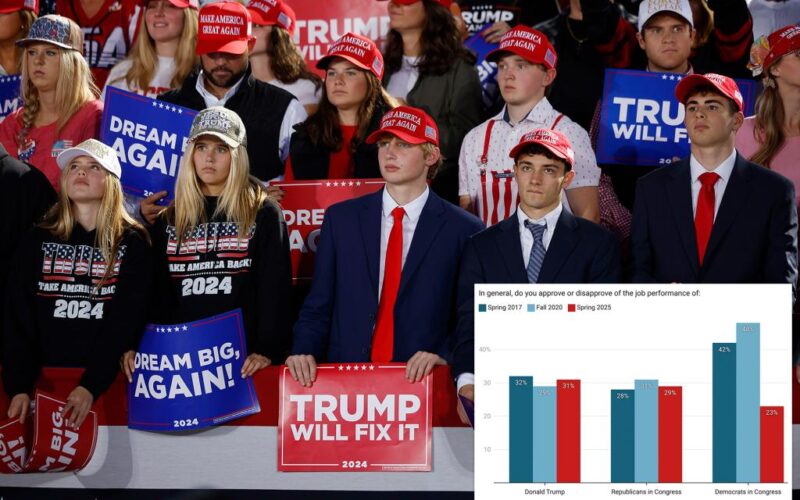WASHINGTON — House and Senate Democrats are at a low ebb among Americans under 30, with just 23% approving of party lawmakers in the wake of President Trump’s return to the White House.
A Harvard Kennedy School Institute of Politics survey released Wednesday found that even as Trump’s approval rating among young Americans remains stable, Democrats’ favorability numbers have plummeted 25 percentage points since fall 2020 — to just 23% from the relatively dizzying heights of 48%.
In 2017, early in Trump’s first presidential term, the survey showed congressional Democrats had a slightly lower approval rating of 42% from younger Americans.
Approval of both Trump and congressional Republicans among the young has consistently hovered around 30% between 2017 and 2025, per the poll, with the lawmakers gaining a one-percentage-point boost from 28% to 29% over that period.
Trump’s support shrank from 32% to 31% in the same time frame, though notably the 47th president’s approval rating among young black Americans has risen to 16% from just 6% in spring 2017.
Asked to compare the presidencies of Trump and his predecessor, Joe Biden, a plurality of 41% said America was better off under the 46th president and 25% said the country is better off now.
Of the remaining cohort, 17% said they weren’t sure and 14% said there was no difference.
The findings follow then-Vice President Kamala Harris’ startling underperformance with young voters in the 2024 election — and show the Democratic Party is still struggling to meet the moment with their messaging against the Republican trifecta dominating Washington, DC.
Voters between the ages of 18 and 29 years old had favored Harris over Trump 55% to 42%, exit polls from Edison Research found in November, but Joe Biden had swamped Trump with the same demographic, 60% to 36%, four years before.
Leading Democratic lawmakers have taken aim at Elon Musk’s Department of Government Efficiency (DOGE) — and the Trump administration’s battle with federal courts over deportations of alleged gang members and visa revocations of anti-Israel college students.
On the first front, former House Speaker Nancy Pelosi (D-Calif.) backed a controversial government shutdown to try to gain leverage over Republicans while fighting to stop passage of a federal spending bill in March — but that was shot down by a group of Senate Democrats led by Minority Leader Chuck Schumer (D-NY).
The Senate Democratic leader claimed a shutdown would have let “DOGE shift into overdrive” — and subsequent internal party polling has confirmed that the best performing messages for the party have been around feared cuts to federal benefit programs such as Medicare, Medicaid and Social Security.
Congressional Republicans have denied that legislation will target the programs.
“We’re going to protect Medicare, Social Security and Medicaid,” current Speaker of the House Mike Johnson (R-La.) stressed earlier this month. “At the same time, we have to root out fraud, waste, and abuse.”
“We stand with President Trump to protect Social Security, Medicare, and Medicaid,” Senate Majority Leader John Thune (R-SD) also said at the time.
Some Democrats have also flown to El Salvador to visit with purported MS-13 gang member Kilmar Abrego Garcia to demand his return to the US after the Supreme Court ordered Trump’s Justice Department to “facilitate” his release from custody there.
Others have advocated for the release of Columbia University protest leader Mahmoud Khalil after Immigration and Customs Enforcement (ICE) officers arrested him on the Morningside Heights campus for allgedly having “led activities aligned to Hamas, a designated terrorist organization,” per Department of Homeland Security spokeswoman Tricia McLaughlin.
“Absent evidence of a crime, such as providing material support for a terrorist organization, the actions undertaken by the Trump administration are wildly inconsistent with the United States Constitution,” House Minority Leader Hakeem Jeffries (D-NY) thundered last month following Khalil’s arrest.
The survey also found that most young Americans (51%) are still concerned that the nation is on the wrong track, nearly a third (31%) aren’t sure and just 15% said the US was headed in the right direction.
The 2,096 respondents between the ages of 18 to 29 who were surveyed also registered a low degree of trust in Congress (18%), the president (23%) and the Supreme Court (29%).
The Kennedy School poll was conducted March 14-25, with a margin of error of plus-or-minus 3.21 percentage points.








